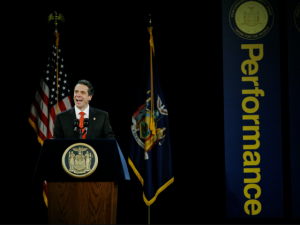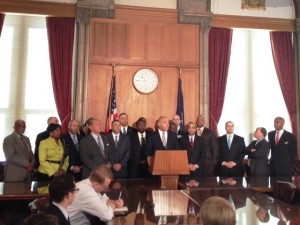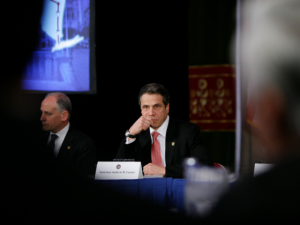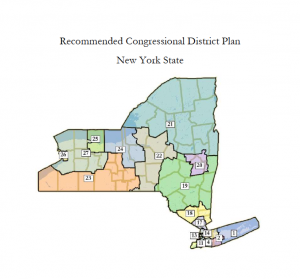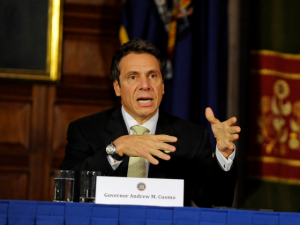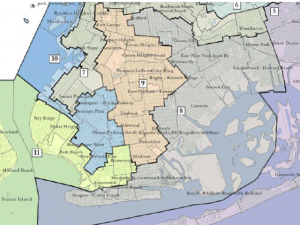Colby Hamilton appears in the following:
5 Cuomo 'Big Ugly' Legislation Highlights
Thursday, March 15, 2012
It began at 7 pm on Wednesday and wasn’t finished until after 7 am on Thursday, but Governor Andrew Cuomo and legislative leaders have hammered out the details on the Governor’s five-point policy agenda for this year’s budget. They're calling the franken-legislation 'The Big Ugly.' Here's what it all means, and who's is and is NOT pleased.
'The Capitol Pressroom' with Susan Arbetter
Thursday, March 15, 2012
 Today on "The Capitol Pressroom":
Today on "The Capitol Pressroom":
Governor Andrew Cuomo joins us with reaction to deals on pension reform, redistricting, teacher evaluations, DNA, casino gambling amendment.
PEF’s Kenneth Brynien is none too pleased with pension reforms. He will be here just prior to a union rally against Tier VI at the Capitol.
Upstate Assemblywoman Claudia Tenney is also an unhappy camper. Her district is so bizarrely shaped that she submitted her own proposal to Governor Cuomo.
We have a Gaggle of Goo Goos including NYPIRG’s Russ Haven & Bill Mahoney; the League of Women Voters’ Barbara Bartoletti & Dick Dadey of the Citizens Union.
For show archives, please visit The Capitol Bureau's website here.
New York gambling tribes mistrusftul of Cuomo's amendment push
Wednesday, March 14, 2012
During his State of the State speech in January, Governor Andrew Cuomo said New Yorkers were living in a “state of denial” when it comes to “gaming” (or what most people consider gambling) in New York State.
“It is not a question of whether or not we should have gaming in this state; we have gaming in the state of New York,” the Governor said. “We have tribal casinos all across the state. We have racinos all across the state. We don't realize it. We don't regulate it. We don't capitalize on it. But we have gaming."
The answer, Cuomo says, is to change the constitution of the state to make gambling legal. He’s asked the legislature to support a plan that could see the proposal before voters as early as next year.
But the two largest tribal gaming nations in New York, the Senecas and Oneidas, say they have been shut out of the discussion about the future of gambling in New York. Neither nation says the Governor has said or done anything so far to allay fears that they could—once again—be on the losing end of state policy.
'The Capitol Pressroom' with Susan Arbetter
Wednesday, March 14, 2012
 Today on "The Capitol Pressroom":
Today on "The Capitol Pressroom":
While unions of all stripes continue a full court press against the Governor’s pension reforms, the Empire Center for New York State Policy is out with a poll today indicating a majority of public school teachers support at least some of the pension revisions the Governor is pushing for. Tim Hoefer joins us with the details.
More aid is on the way to victims of flooding in upstate NY.
Common Cause’s Susan Lerner returns with redistricting analysis, as well as what she says are the significant differences between the judicially and legislatively drawn maps.
The Senate Democratic Minority says sure it might be Sunshine Week everywhere else, but here in the murky world of Senate Republican power, things have gotten Duma-like. Senator Liz Kruger, the ranking Dem on the Finance Committee, joins us to discuss this and other issues including redistricting and reproductive rights.
Students and faculty from SUNY and CUNY are asking lawmakers to reverse the decline caused by 3 years of budget cuts totaling almost $2 billion. NYPIRG’s Bill Mahoney, UUP’s Marc Dearstyne of SUNY Cortland and Buffalo State student Alex Bornemisza join us with details.
For show archives, please visit The Capitol Bureau's website here.
Legislative minority Caucus vows to vote against redistricting proposal
Wednesday, March 14, 2012
The Black, Puerto Rican, Hispanic and Asian Legislative Caucus--made up of members of both the state Senate and Assembly--released a statement Wednesday saying it plans to vote against the legislative redistricting proposal.
"These lines crack and pack minorities with blatant disregard to communities of interest and in some instances county lines," the statement said. "The Caucus sees it as an unparalleled power grab by the Senate Republicans to maintain their current strong holds and dilute the power of minority communities. Although it has been the traditional practice to allow each house of the legislature to determine its own lines, standing idly by as theses lines are proposed would be an injustice to our constituents."
The caucus is led by Brooklyn Democratic Assemblyman Karim Camara.
The announcement comes in anticipation of a vote on the proposal, drawn up by the majority parties in the Senate and Assembly, this week. While the Caucus members from the Senate are all in the minority party, the 34 members from the Assembly could be a problem for the Democratic leadership. Assembly Republicans, joined by the Caucus and other Democrats who have vowed to vote against the lines, could form a large enough bloc to strike down the proposal.
Members of the Caucus are holding a press conference at 10:30 am and we'll update this post after.
Cuomo: 'Trust is low' that state legislature will enact redistricting reform
Tuesday, March 13, 2012
By Karen DeWitt, New York State Public Radio Capital Bureau Chief
Governor Andrew Cuomo, in an interview with public radio, says he’s still trying to hash out an accompanying statute to go with a constitutional amendment to change redistricting reform.
Cuomo says the legislature’s proposed constitutional amendment, as currently written, is not good enough, and any final deal hinges on how tightly structured the proposed law would be. Cuomo says of the legislature’s efforts to reform redistricting, “my trust is low, my skepticism is high”.
The governor says if there’s a failure to reach an accord, and the legislative lines are ultimately drawn by a federal magistrate, then the resulting maps would “probably get you somewhat better lines” than any product from the Senate and Assembly.
On pensions, Cuomo says talks on reforming the system are on going, and in order to reach a deal, he’d accept reforms that are not in the form of a new benefit tier, as long as the savings are there. He warns the alternative to pension reform is “thousands of layoffs” of employees in local governments around the state.
Union sources have accused the governor of playing politics, and staging a fight with organized labor as part of a strategy to run for President in 2016. Cuomo denies this, saying it’s “not about future campaigns, this is about past campaigns’ saying unions did not back him in 2010 governors’ race. He says the reason is that he told union leaders at the time that he intended to change the public pension system.
Cuomo also clarified his position on the reproductive health act, which would further protect a woman’s right to choose abortion, saying he “fully” supports it.
“I’ve been a long supporter of pro choice issues going way, way back, and I always will be,” Cuomo said.
This story has been updated from an earlier version.
Freshman Congressman Bob Turner announces bid for US Senate
Tuesday, March 13, 2012
Congressman Bob Turner (Courtesy of the Turner campaign)
This first hints of this were reported by Politico's Maggie Haberman and the confirmation by Celeste Katz of the Daily News, and it's now official: Queens-based Republican Congressman Bob Turner is tossing his hat into the ring to challenge US Senator Kirsten Gillibrand in November.
The full statement is below. Turner now joins three other candidates: Rye Town Supervisor Joe Carvin, Manhattan attorney Wendy Long, and Nassau County Comptroller George Maragos.
I will travel to the Republican State Convention in Rochester later this week and humbly ask for the Republican nomination for the United States Senate. I will respectfully ask for the Conservative nomination a few days later at that Party's convention. I have made my intentions known to the other Republican candidates in this race.
I ran for the House six months ago as a private citizen fed up with what is happening in Washington. I could not sit and watch career politicians sink my nation deeper into economic crisis. Brooklyn and Queens voters, of all political parties, graciously responded by sending me to Congress. It now appears that their district has been eliminated.
There is serious work to be done to get this economy back on track, and I will not walk away from that work now. I will run for the Senate, and I will run to win.
This post has been updated from its original.
'The Capitol Pressroom' with Susan Arbetter
Tuesday, March 13, 2012
 Today on "The Capitol Pressroom":
Today on "The Capitol Pressroom":
Governor Andrew Cuomo joins us at 11:06am to discuss Tier VI and redistricting.
Assembly Majority Leader Ron Canestrari will have highlights from the Assembly's budget.
Then, how can the state & municipalities earn revenue from hydrofracking, while at the same time, paying for the costs associated with it? It’s a question that Carol Chock and Dan Barber have been trying to figure out. They are part of a working group associated with the Tompkins County Council of Governments (TCCOG), which is urging New York State to refrain from issuing gas drilling permits until "it can capture appropriate taxes and fees and allocate them to cover costs to all levels of government, based on sound policy and verifiable data." Both Chock and Barber will join us to explain.
And the New York Immigration Coalition is pushing for a New York State version of the Dream Act that would provide TAP funding to illegal immigrants attending New York State colleges and universities. Chung-Wha Hong, Executive Director of the NY Immigration Coalition and 23 year old CUNY student Yajaira Saavedra will join us.
For show archives, please visit The Capitol Bureau's website here.
Quinn continues her lead 2013 mayoral polling
Tuesday, March 13, 2012
A new Quinnipiac University poll is out and you know what that means: a new 2013 mayoral candidate question.
According to the poll, Council Cpeaker Christine Quinn continues to be the favorite of those polled, with 25 percent saying if they had to pick a candidate today, she'd be it.
Before we get to the rest of the numbers, it's worth noting two things about the poll. One, Police Commissioner Ray Kelly was not included as a potential candidate, unlike previous Quinnipiac surveys. And two, the continued troubles Comptroller John Liu has had over his campaign's fundraising practices.
Given both those, who appears to win from both situation? Former Comptroller Bill Thompson, followed by Speaker Quinn. Let's take a look at this poll's numbers, side-by-side the last poll in December.
| 13-Mar | 15-Dec | 19-Oct | 27-Jul | |
| 2012 | 2011 | 2011 | 2011 | |
| Markowitz | 15 | 13 | 14 | 12 |
| Stringer | 7 | 5 | 5 | 4 |
| Liu | 7 | 7 | 10 | 10 |
| Quinn | 25 | 18 | 17 | 18 |
| Thompson | 13 | 7 | 8 | 8 |
| Allon | 2 | - | - | 1 |
| de Blasio | 9 | 6 | 6 | 6 |
| Kelly | na | 24 | 25 | 23 |
| SOMEONE ELSE(VOL) | 5 | 4 | 4 | 2 |
| DK/NA | 17 | 15 | 12 | 16 |
To be fair, everyone did a little bit better. It will be interesting to see what the numbers look like when they drop Brooklyn Borough President Marty Markowitz's name from the list.
Also in the poll voters were asked if they believed Comptroller Liu should resign. A plurality--44 percent--said no, even as the number that said yes climbed significantly to 33 percent.
“Who should move into City Hall when Mayor Bloomberg moves out? Council Speaker Christine Quinn tops the list of usual suspects and has an impressive job approval,” said Maurice Carroll, director of the Quinnipiac University Polling Institute, in a statement. “After the drum-beat of negative news, Comptroller John Liu’s job approval numbers are tepid, but New Yorkers don’t think he should quit.”
The poll surveyed 964 New York City voters between March 6 and 11. Its margin of error is plus or minus 3.2 percentage points. Both land lines and cell phones were used.
Congressional plan finalized by federal judge--updated
Tuesday, March 13, 2012
Federal magistrate judge Roanne Mann posted her final recommended congressional maps online late Monday. The plans show only slight changes from the original draft maps. Most notably, Mann reconfigured the Voting Rights Act-protected majority black districts in Brooklyn. Local lawmakers and community organizers were upset over the first set of maps they say unfairly divided communities that had traditionally been represented in the same district.
Mann's new maps appear to rejoin the Fort Greene and Clinton Hill neighborhoods with the western-most district currently represented by Congressman Ed Towns.
Participants in the federal case that kick-started the court's drawing of new congressional lines will have until Wednesday to file their objections. The three-judge panel will convene on Thursday March 15 and hold a public hearing to receive feedback on the proposal. The anticipation is the court will vote agree on lines before the start of petitioning for the congressional primary on March 20.
Meanwhile, New York's legislature has put forth maps for its own set of seats. No congressional plan has been presented by lawmakers, which may be the final sign the legislature is abdicating its constitutional responsibility to draw the state's congressional lines.
Redistricting battle shifts from lines to an amendment
Monday, March 12, 2012
It’s official: the sticking point over redistricting in Albany is no longer whether the lines will be drawn independently, nor whether they’ll be less “hyperpartisan” in their second draft, but what the accoutrement tacked on—a constitutional amendment and a pre-emptive statute with similar language just in case the legislature fails to live up to its end of the bargain—will look like.
Now that Governor Andrew Cuomo has admitted he “just lost” the battle for redistricting reform for this year’s lines, it looks like he’d like to turn all attention to the future. So now the big battle has become what a constitutional amendment, and the corresponding legislative backstop, will look like.
Cuomo: Magistrate's congressional lines '98 percent' the same as legislature's proposals
Monday, March 12, 2012
Late on Sunday, the state legislature finally released their plans for new Senate and Assembly districts. While the public hasn’t been shown any actual maps as of this writing, Governor Andrew Cuomo took to the airwaves to weigh in on the proposal.
“They put forth lines. They consulted with my people in redoing the lines. They made changes. They lines are far from perfect but I believe they made progress on the lines,” Cuomo said.
While the Governor did promise a veto of the lines if the total package—“better” lines, a constitutional amendment to change future redistricting, and a statute that would put the process change into law—he warned those who see a veto as the best chance for seeing the best lines possible.
"I bet you they're 98 percent the same,” Cuomo said, suggesting that the Assembly and Senate proposals for congress were the starting points for the magistrate’s lines.
Really? Let’s take a quick run through, courtesy of the CUNY Graduate Center’s Center for Urban Research, of some examples to test that claim.
Here’s Long Island—the Assembly’s plan, the Senate’s Plan and the magistrate’s plan.


 You'll notice that in both legislative maps, and more so in the Senate's map, the districts on Long Island are drawn north to south. In the magistrate's maps the districts are east to west, and are significantly more compact.
You'll notice that in both legislative maps, and more so in the Senate's map, the districts on Long Island are drawn north to south. In the magistrate's maps the districts are east to west, and are significantly more compact.
Here’s Western New York, same comparison.
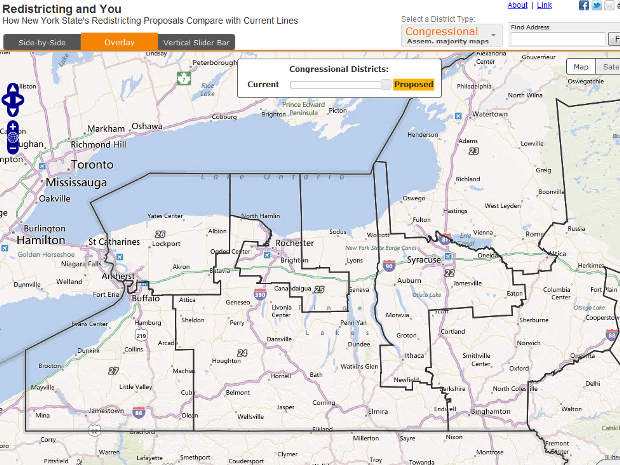
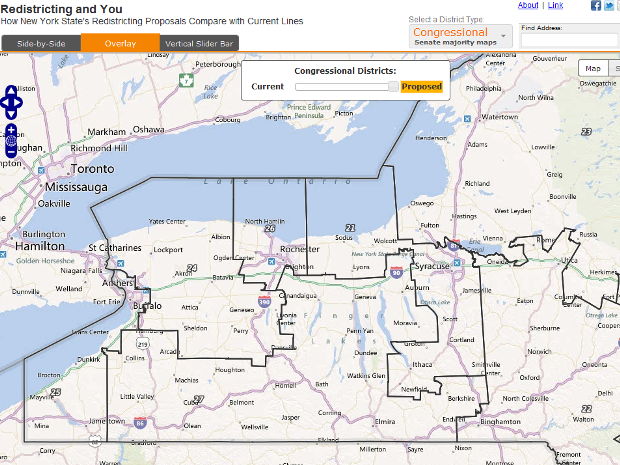
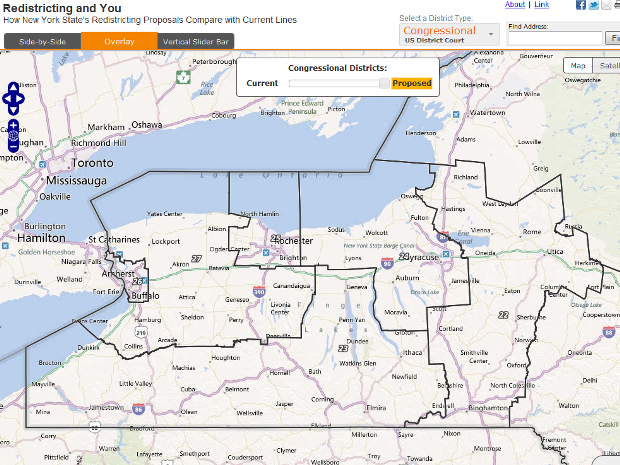 The biggest difference between in these maps I think is how the magistrate handled the Buffalo area. Unlike the Assembly and Senate maps, the Buffalo area is wholly inside its own district, instead of being divided up in the legislative maps. Likewise the Pennsylvania border area in Western New York is in one district in the magistrates plan, versus two in each of the legislators' maps.
The biggest difference between in these maps I think is how the magistrate handled the Buffalo area. Unlike the Assembly and Senate maps, the Buffalo area is wholly inside its own district, instead of being divided up in the legislative maps. Likewise the Pennsylvania border area in Western New York is in one district in the magistrates plan, versus two in each of the legislators' maps.
“It certainly doesn't appear like the courts maps are…close to anything that exists or have been proposed, with the exception of Common Cause's maps,” said Steven Romalewski, director of the mapping services at CUNY.
There has been considerable debate about the quality and fairness of the lines—as the Governor pointed out—but one thing is for certain: the only thing that’s 98 percent similar between the magistrate’s maps and the state legislators is the fact they’re all drawn in New York State.
'The Capitol Pressroom' with Susan Arbetter
Monday, March 12, 2012
 Today on "The Capitol Pressroom":
Today on "The Capitol Pressroom":
Big week in Albany with both budget and redistricting.
Former Senate Majority Leader Joseph Bruno wants taxpayers to reimburse him for his legal fees. The Times Union says his request is premature. The TU's Editorial Page Editor Jay Jochnowitz joins us on the show to discuss the paper's position on this issue, as well as an upcoming Doonesbury strip dealing with a Texas law requiring a mandatory sonogram before an abortion. The cartoon has sparked debate among newspaper editors around the country.
$81.3 billion dollars over 60 years plus millions in real property tax revenues and loss opportunities. THAT's how much the Delaware County Board of Supervisors Board is demanding in "reparations from the City and State for the mineral rights taken from affected landowners and communities" in light of the "no gas drilling" policy in place within in the NYC Watershed. This is the next big legal issue that will face the municipalities in the gas drilling debate. Paul Finkelman, the President William McKinley Distinguished Professor of Law and Public Policy and Senior Fellow, Government Law Center at Albany Law School joins me today to explain the constitutional provision allowing for such a lawsuit.
State Senator Dan Squadron is looking for 38 signatures. Why? He and Rory Lancmen are sponsors of the "Corporate Political Activity Accountability to Shareholders Act" (S101/A696A) that would require shareholder approval for corporate political contributions, public disclosure of the contributions, and justification of the business rationale for making them. But the bill was prevented from moving out of committee last week by a vote in the the Corporations, Authorities, and Commissions Committee. In response, Squadron has now begun circulating a petition for chamber consideration of the bill. If he gets the signatures of 38 State Senators he can bring the bill to the floor of the Senate.
For show archives, please visit The Capitol Bureau's website here.
State court on 63-seat senate proposal: we can't get involved yet--updated
Friday, March 09, 2012
State Supreme Court Judge Richard Braun agreed to dismiss a lawsuit over Senate Republicans' proposed 63-seat redistricting maps, saying the proposed lines are just that, a proposal, and thus wasn't subject to a constitutional review.
"The controversy in this action/proceeding is simply not ripe for the court's review," Braun wrote in his decision. "At this point, a 63-seat State Senate is merely a recommendation...that may not be enacted by the Legislature or signed into law by the Governor, and thus the matter is not justiciable."
Senate Democrats, who were behind the lawsuit, say the decision today doesn't mean the issue is settled.
"The Judge made it clear that this is simply a procedural move related to timing and if Republicans try to pass their unconstitutional lines containing a 63rd Senate District the Court will be ready to step in," Senate Democratic spokesman Michael Murphy said in a statement.
Senate Republicans haven't released a statement yet but if and when they do we'll update.
Senate Republican spokesperson Scott Reif sent this response: "The size of the Senate is dictated by a formula in the State Constitution, and that formula requires us to add a 63rd seat. We are pleased with this ruling and continue to believe that our plan is legally and constitutionally sound."
'The Capitol Pressroom' with Susan Arbetter
Friday, March 09, 2012
 Today on "The Capitol Pressroom":
Today on "The Capitol Pressroom":
Senator Michael Gianaris on why any deal on redistricting that doesn’t include a veto isn’t enough.
Colleen Taggarty, the Superintendent of the Olean City Schools says the question is no longer “where do we cut” it’s become “how do we become insolvent”?
And data driven policing is in the news again today and not in a good way: Why do we continue to measure the wrong things? That’s what Eli Silverman and John Eterno ask in their new book “The Crime Numbers Game: Management by Manipulation” published by CRC Press, one installment in a series of texts exploring advances in Police Theory & Practice. Both Silverman and Eterno have unique experience with CompState, NYPD’s computerized crime tracking system. They will join me on today’s show.
For show archives, please visit The Capitol Bureau's website here.
Whither the health insurance exchange?
Friday, March 09, 2012
That's what Senate Democratic Minority Leader John Sampson asks his colleague on the other side of the aisle in a letter sent out today.
As part of the federal health reform passed two years ago--you may know it as "Obamacare"--the state's obligated under law to set up a health insurance exchange. The Assembly has already passed a bill from the Governor's office to create "market-place for the purchase and sale of qualified health plans in the State of New York."
This isn't the first time Sampson's pushed Skelos to adopt the Governor-supported health insurance exchange: "In response to my previous letter, you assert that it would be both 'fiscally irresponsible' and a 'disservice to New York taxpayers' to comply with the federal statute at this time. On the contrary, the time to act is now."
That letter Sampson refers to was sent on February 27 and spent much of the ink blasting senate Democrats over their stewardship as the majority in 2009 and 2010. Skelos also pointed to what he said were the prohibitive costs of enacting the plan, writing, "One study estimates these federal health reforms could cost New York taxpayers more tha $65 billion for the Medicaid portion alone!"
Sampson counters: "Your letter incorrectly states that setting up an exchange will drive up costs for New Yorkers. The $65 billion figure you cite comes from a report by the conservative-leaning Cato Institute, which fails to acknowledge that – because New York already offers coverage to certain expanded populations – it is due to receive enhanced reimbursements once the law is implemented."
And that's not the half of it, he goes on to say. Sure there are what he sees as the--more affordable rates, an easier to understand system, etc.--but do you really want the feds making this decision for us?
"[I]f New York does not have a health exchange up and running by January 1, 2013, the federal government will establish one for us. I cannot imagine that you would prefer that option. Simply put, time is running out for New York to have the mechanism in place to comply with the federal mandate," Sampson writes. "I am sure you agree that New Yorkers, rather than Washington, D.C. bureaucrats, should be making these decisions for our state."
Health Exchange Letter to Skelos 3 8 12 Final 1
Republican Senate candidate Maragos gets spot on primary ballot
Thursday, March 08, 2012
By Karen DeWitt, New York State Public Radio Capital Bureau Chief
George Maragos, the front running Republican to challenge US Senator Kirsten Gillibrand admits he faces an “uphill battle," but the former banker and current Nassau County Comptroller says he’ll spend up to $5 million dollars of his own money to compete.
Maragos has secured 25 percent of the party's delegates support to guarantee a spot on the Republican primary ballot for the Senate seat. He says he expects more endorsements from county leaders in the coming days before the GOP convention March 16. Maragos is anti-abortion and personally against same-sex marriage, though he says he respects New York’s marriage law. But he says he’d rather focus on improving the economy, and that too much attention has been paid to social issues in the GOP Presidential campaign lately.
“The crises that we’re facing in our country are not the social issues, they’re the economic issues,” said Maragos. “We’re losing sight of that.”
Maragos says he needs $15 million dollars to run a credible campaign, and is willing to spend several million of his own fortune to do it. He’s facing potential primary challenges from Rye Town Supervisor Joe Carvin and New York City Attorney Wendy Long.
Congressional primary challenges are shaping up in Brooklyn
Thursday, March 08, 2012
The Politicker blog has this piece on the coming primary battle between city councilman Erik Dilan--son of state Senator Martin Malavé Dilan, and close ally of Brooklyn's powerful Democratic party leader, Assemblyman Vito Lopez--and 10-term incumbent congresswoman Nydia Velazquez:
“The time is right for change,” Mr. Dilan told The Brooklyn Paper“We’ve had an incumbent who has been there for 20 years and she’s done little with the post. She’s going to have to justify after 20 years of nothing, why she should remain in office.”
Mr. Dilan undoubtedly has been paying attention to the redistricting process, as Ms. Velázquez’s district became slightly more favorable to Mr. Dilan’s challenge in the recently released court-drawn map. Notably, her seat absorbed Hasidic Williamsburg where the largest sect is allied with Mr. Lopez.
Add this to the already percolating three-way battle for Congressman Ed Towns' seat, and it looks like Brooklyn will see a busy, if truncated, primary season.
'The Capitol Pressroom' with Susan Arbetter
Thursday, March 08, 2012
 Today on "The Capitol Pressroom":
Today on "The Capitol Pressroom":
Political Science Professor Dr. Gerry Benjamin of SUNY New Paltz joins us with some thoughts on the provisions that we should look for –- and look out for -- in a possible constitutional amendment on redistricting.
Barbara Bartoletti of the League of Women Voters shares her analysis of the Congressional lines as they currently stand.
Monica Arias Miranda, President and CEO of the Hispanic Coalition NY, announced this week she is running for State Senate in the 46th District to unseat incumbent Neil Breslin.
How information is made available online "fundamentally controls what can be done with it", according to the Sunlight Foundation. Today we meet Sean Brady, President of Prism Decision Systems, who is pushing New York State to create an open data portal which provides users with data in "non-proprietary formats". What's that mean? Why is it important? And how would it differ from NY's current open government initiatives?
For show archives, please visit The Capitol Bureau's website here.
Assemblyman Camara: I 'strongly object' to court's congressional plan for Brooklyn
Wednesday, March 07, 2012
 In a forceful letter to magistrate judge Roanne Mann, Brooklyn Assemblyman and head of the Black, Puerto Rican, Hispanic & Asian Caucus, Karim Camara made it clear he was not keen on the way Brooklyn's two historically black congressional districts had fared in the judge's draft maps.
In a forceful letter to magistrate judge Roanne Mann, Brooklyn Assemblyman and head of the Black, Puerto Rican, Hispanic & Asian Caucus, Karim Camara made it clear he was not keen on the way Brooklyn's two historically black congressional districts had fared in the judge's draft maps.
Camara has a two-fold beef: the district that closely tracks Rep. Yvette Clarke's district--a mostly ethnically Caribbean area--now shoots north to pickup the historic African American neighborhoods of Fort Greene and Clinton Hill, while the Rep. Ed Towns doppelganger district is now shooting all the way down to Coney Island. To do this Towns' district has to pick up a large chunk of mostly white neighborhoods in southeastern Brooklyn.
"These neighborhoods have nothing in common – racially, culturally, geographically, ideologically or socioeconomically – with the African-American neighborhoods of central and east Brooklyn and it would be a grave mistake to include them," Camara writes.
He goes on to blast the judge for drawing both Congressman Towns and one of his rivals for the job, Assemblyman Hakeem Jeffries, out of the district they've been running to represent.
Judge Mann's proposed Towns and Clarke districts. (Courtesy of the Eastern District Court.)
"The plan proposed by the court will short-circuit a democratic contest that is already underway, possibly depriving hundreds of thousands of African-American and Latino voters the opportunity to support the candidate of their choice," Camara writes.
If you look at the voting age population the Department of Justice would be looking at when they review Voting Rights Act-protected districts (the judge's plans wouldn't be reviewed by DoJ), Mann's maps would make Towns' district 51.5 percent black and Clarke's district 51.3 percent. Compare that to the Assembly's (51.9/51.6) and the state Senate's (52.9/51.1) maps for Towns and Clarke respectively.
So what would Camara have the judge do? "...Coney Island would more clearly benefit from inclusion in the new NY-9," he writes. "NY-9 could move south from the neighborhoods of Flatbush and Midwood, adding Gravesend and Coney Island. Eastern Parkway could then serve as NY-9’s northern border."
The Assemblyman then suggests Towns' district would "take back in Fort Greene, Clinton Hill, Prospect Heights and southern Williamsburg, communities that were inexplicably removed simply to accommodate the addition of Coney Island."
Without a new map, it's hard to know how that would effect the delicate balance happening to keep both districts black majority districts. One thing is certain: we're told we can expect more push back on the judge's lines in the coming days as black and Latino leaders mobilize for what they see as an unfair process.
Camara's full letter is after the jump.

